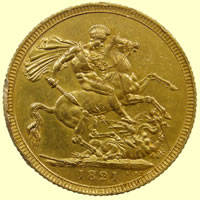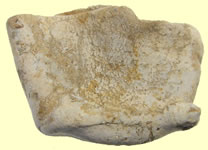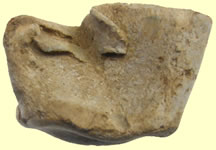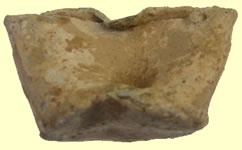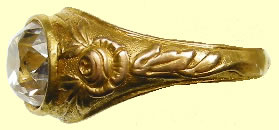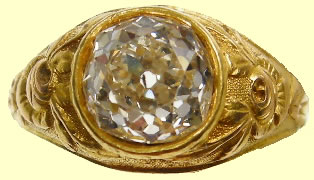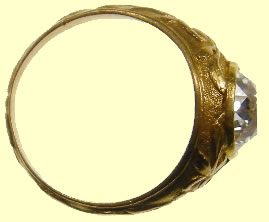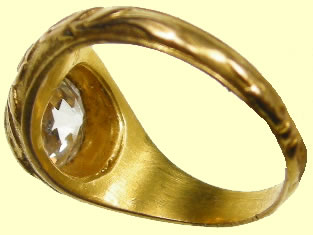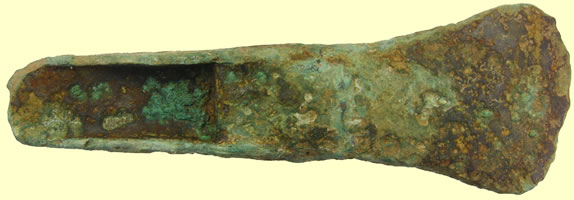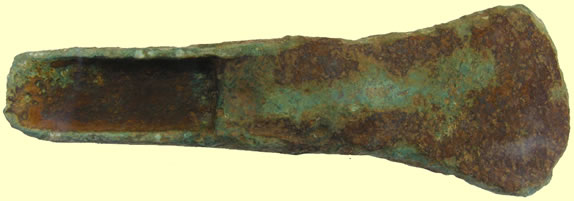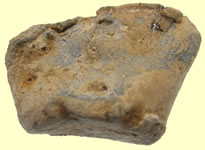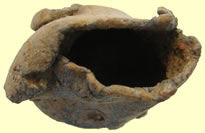

Metal detecting holidays in England with the World's most successful metal detecting club.
Twinned with Midwest Historical Research Society USA
| 2013 Sept finds page |
|
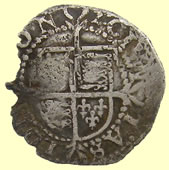 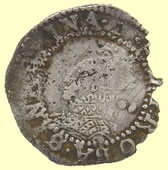 |
||
| 1821 George IV milled gold full sovereign | 1602 Elizabeth 1st hammered silver half groat - 7th issue - 2 mint mark | ||
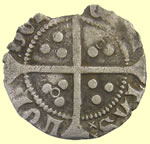 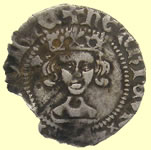 |
 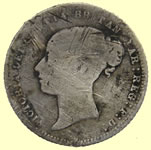 |
||
1422 -1427 Henry VI hammered silver penny - annulate issue - pierced cross 1 1 in 2 quadrants Obv + HENRICVSxREXxANGLIE Rev - CIVI/TASLOND/DON |
1871 Victoria milled silver sixpence | ||
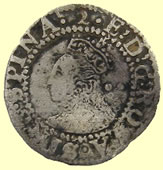 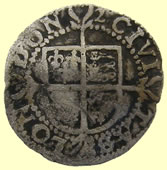 |
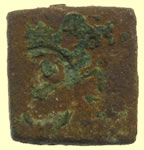 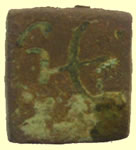 |
||
| 1602 Elizabeth 1st hammered silver half groat - 7th issue - 2 mint mark | 18thC apothecary weight | ||
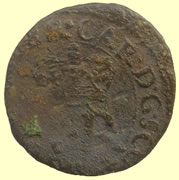 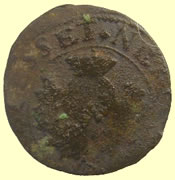 |
|||
| Fascinating hammered copper coin -with Scottish Thistle on rev. Charles I (1625-1649) copper turner or half groat (two pence). Obverse: Crowned "CR". Legend: "CAR D G SCOT ANG FRA ET HIB R" (Charles by the grace of God King of Scotland England France and Ireland). Reverse: Thistle: "NEMO ME INPVNE LACESSET" (No one shall hurt me with impunity). |
|||
|
|||
| 2- 1640's English Civil War lead gun powder measure and cap | |||
 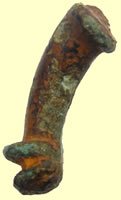 |
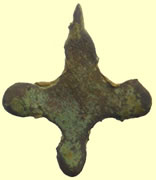 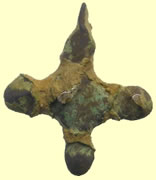 |
||
| 2ndC Roman trumpet brooch | Medieval harness pendant - some gilding remains | ||
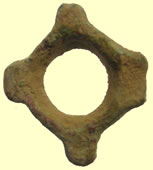 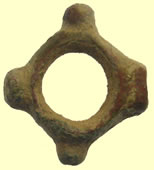 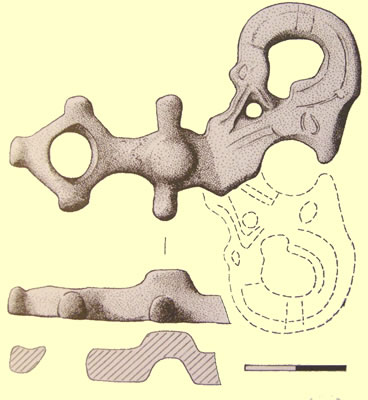 |
|||
circa 10thC Anglo- Scandinavian harness cheek piece |
|||
|
|||
| 18thC possible 1.25 carat 'Mine cut' diamond gold ring - reported as potential treasure 4.17g, 17.64 mm dia | |||
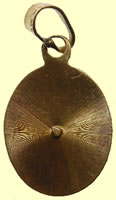 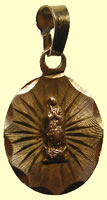 |
 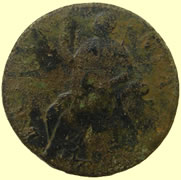 |
||
| 20thC 14k gold Mexican Madonna pendant | Great condition 1694 William III copper penny | ||
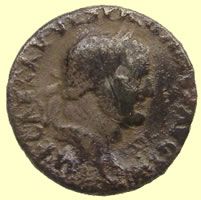 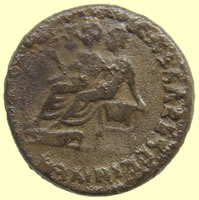 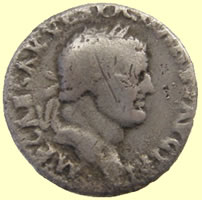 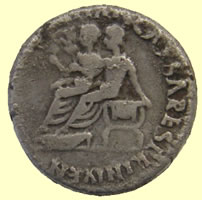 |
|||
2ndC Roman silver sent for ID - cleaned up now 2.94g, 16.76mm 1stC Roman silver sent for ID 2.94g, 16.76mm If you believe in "good omens", this might well be a hint that this will be an exceptional season. This denarius is scarce-to-rare and in demand as a "dynastic piece", portraying all three of the Flavians. Vespasian issued it and the two figures seated on curule chairs on the reverse are Titus and Domitian. This piece, from the mint at Rome (* see below), dates to relatively early in Vespasian's rule, c. 69-70. The legends are "almost" clear to read now, if you know what you're looking for. I trust that if you cook this one, the legends will become much more readable in general. The obverse - portrait of Vespasian - is: IMP CAESAR VESPASIANVS AVG / the reverse, with the seated Caesars is: TITVS ET DOMITIAN CAESARES PRIN IVEN* - PrincipiI Iuventutis: "The Princes of Youth" (which was an official and titled position, it can also be read as "The young princes" which is just a description - Latin syntax does not depend on the order of words in a sentence so occasionally interpretation of quotes and inscriptions can be a bit ambiguous and when defining the original intent may be open to opinion. References: * Something else which might be a bit ambiguous is the attribution to Rome. The piece quoted by RIC has a reverse legend which ends in "..IV" rather than "...IVEN". In fact, RIC II, i, does not quote the IVEN ending at all except in the footnotes. The IVEN ending, evidently, is associated with the mint at Lyon (Lugdunum) but is quoted only from a plated piece. I need to check with the "Not In RIC" folks and see if this is a typo, or whether this is a significant, unpublished rarity. Mark PS - I had never looked at the "Not in RIC" site before and it turns out to be only for vols VII & VIII - I might run this one past Curtis Clay, although looking at the listings in the "old" RIC II I see the IVEN variety listed, so it may only be a typo or simple omission in the new RIC.
|
|||
 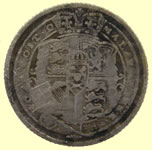 |
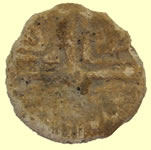 |
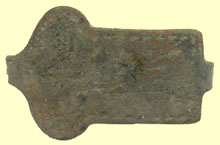 |
|
| 1816 George III milled silver sixpence | 18thC clog fastener | ||
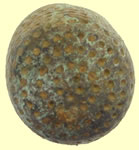 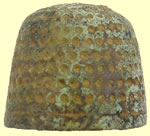 |
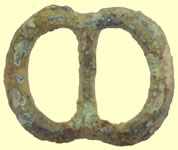 |
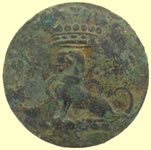 |
|
| 15thC copper thimble | Post Medieval cast copper alloy single loop buckle frame. 1500-1650 AD |
19thC livery button | |
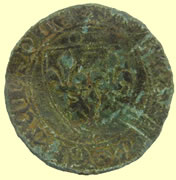 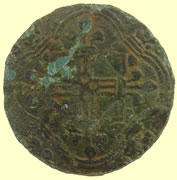 |
 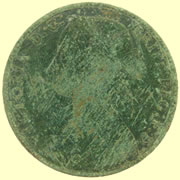 |
||
French copper- alloy Jetton 1380AD Obv Shield of France bearing three fleur de lys Rev trefoil x 4 Ottery St Mary |
Greta patina - 1860 Victoria milled copper penny | ||
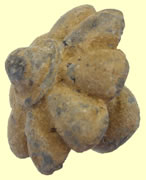 |
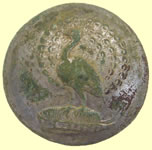 |
 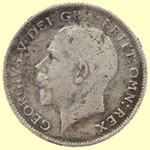 |
|
| Georgian lead tobacco jar lid handle | 19thC livery button | 1914 George V milled silver sixpence | |
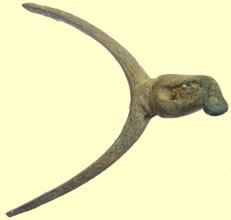 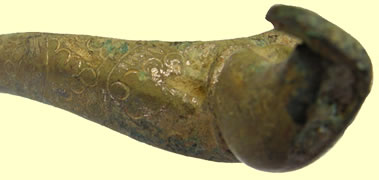 |
|||
| Heavily decorated Georgian spur | |||
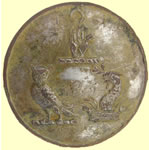 |
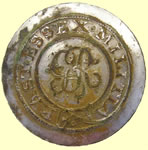 |
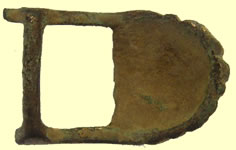 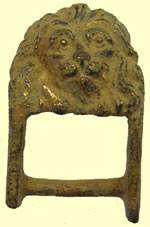 |
|
| 19thC livery button | Rare 19thC Essex Militia button | Neat Georgian buckle | |
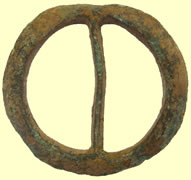 |
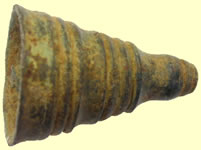 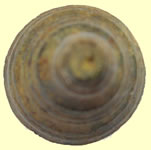 |
||
| Medieval annular buckle | 1500-1770 pole finial mount | ||
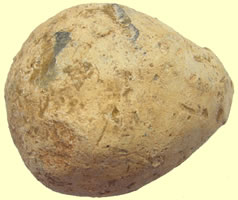 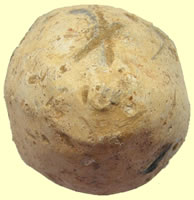 |
|||
| Roman lead ballista shot - 1.5 lbs - 55.9mm L | |||
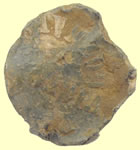 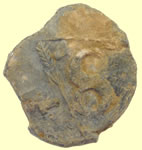 |
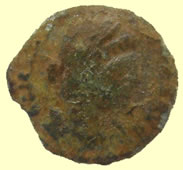 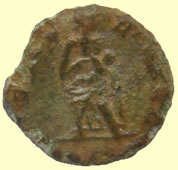 |
||
| Post medieval lead bale seal | 4thC House of Constantine bronze sent for ID This piece is a posthumous commemorative of the "Empress" Theodora, 2nd wife of Constantius I. These were struck as part of the continuation of the large emission of Centenionales dating to the early period after the death of Constantine - 337-340 - by the 3 new Augusti: Constantine II, Constans and Constantius II. The coins in Theodora's honor were struck only at Trier, Rome and Constantinople and I believe the legend on the reverse - PIETAS ROMANA - was never used on the coins of any other member of the Imperial families, at least not in the"Æ" coinage. Mark |
||
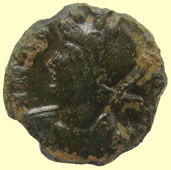 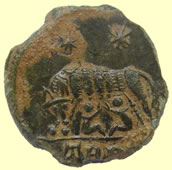 |
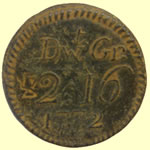 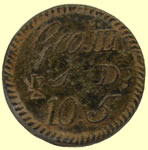 |
||
Shewolf & Twins reverse which is typically found on the VRBS ROMA, City of Rome commemorative, reduced-module folles introduced around 330 AD Sent to Mark for confirmation of ID There's not all that much unusual about your VRBS ROMA city commemorative with the she-wolf and twins reverse, except that what's left of it has a nice, glossy patina. It's from the mint at Trier: "TRP" in the exergue. To tell whether this is part of the earlier or later runs of these, given the chipped edges, I'd need to have it in-hand (if I could tell at all) to try to see by the size and weight whether it's consistent with the module from the beginning of the series c. 330-333, from the middle of the series - 333-335 - or from the very end, c. 336-7 (by which time they had become considerably smaller). Aside from that, there's nothing particularly unusual about it - it's part of the enormous combined emissions of billon Centenionales. (as the denomination is now being named by David Sear, whose conventions I tend to follow.) This huge combined issue began at the time of the dedication of Constantinople and ran until the death of Constantine in 337. These were contemporaneous - in fact were part of the same overall series - as the very commonly encountered GLORIA EXERCITVS - soldiers flanking 1 or 2 standards types in the name of Constantine I and all the various Caesars, as well as the CONSTANTINOPOLIS city commemoratives. Mark |
Stunning dated 1772 George III gold half guinea coin weight - should be 10s and 6 D for normal half guinea Obv 10S 5D - Ten shillings and 5 pence - Ewer counter mark both sides Ref Withers p 229 1998, O 3.87g, 19.25gr, should weigh 18gr |
||
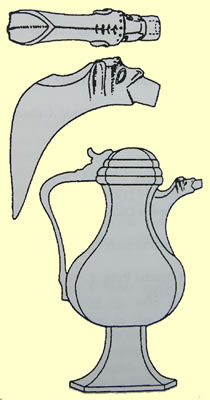 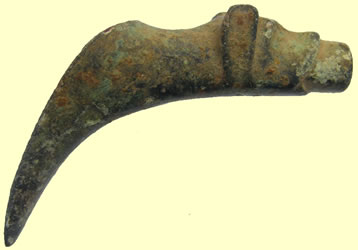  |
|||
| circa 15thC animal headed ewer spout | |||
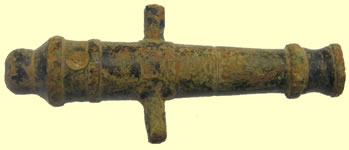 |
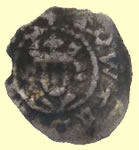 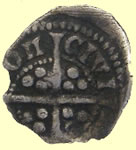 |
||
| 18thC toy cannon | 1300-10 Edward hammered silver farthing 0.21g,10.81mm - Type 28h New issue circle both sides Obv + EDWARDVS REX ANG Rev CIVI/TAS/LON/DON - London mint |
||
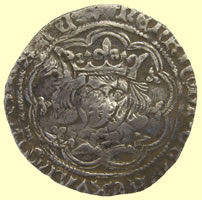 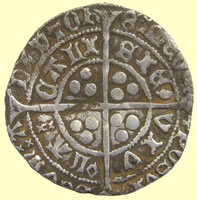 |
|||
Amazing double head strike 1430-34 Henry VI hammered silver groat - Pine cone Mascle issue - Initial mark cross potonce Pinecone and mascle in reverse legend - satire stops - Ref North 1461 Obv HENRIC DI GRA REX ANGL Z FRANCE DNS HYB Rev VIL/LA/ CALI/SIE - Calais Mint 3.63g, 28.7mm
|
|||
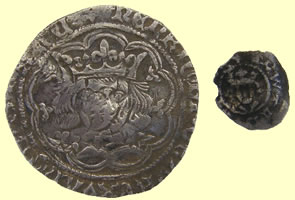 |
|||
| Groat(4 pence)3.63g, 28.7mm and a farthing (1/4 penny) 0.21g,10.81mm size comparison | |||
 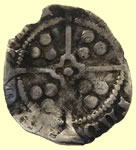 |
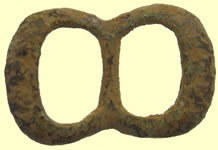 |
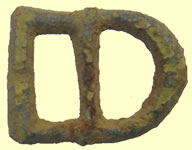 |
|
1427- 1430 Henry VI hammered silver penny - mullets by crown- quatrefoil with pellet at centre of reverse cross - York mint - Archiepiscopal issue Obv HENRICVS REX ANGLIE Rev CIVI/TAS/EBO/RACI - York mint |
Post Medieval cast copper alloy single loop buckle frame. 1500-1650 AD |
A complete cast copper alloy buckle of post-medieval date. The buckle is a double loop asymmetrical shape Circa 1575- 1700 |
|
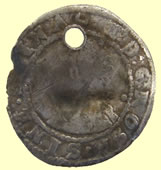 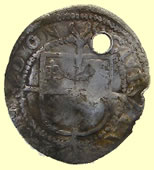 |
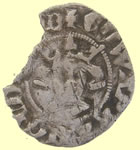 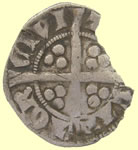 |
||
| 1587-9 Elizabeth 1st hammered silver half groat - Crescent mint mark | 1300-1310 Edward hammered silver penny - Class 10cf3 Obv EDWARR ANGL DNS HYB Rev CIVIAS/CAN/TOR - Canterbury mint |
||
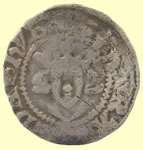 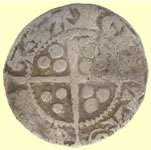 |
  |
||
Very unusual 1272 Edward 1st hammered silver penny - reverse cross only completes on 3 segments - double strike - legend is a CIVI/TAS type but legend is blundered - not a sterling imitation Obv EDWAR ANGLE DNS HYB Rev - CIVI/TAS/ ?? |
Taco'd 1461 - 85 Edward IV hammered silver penny - C on breast- Canterbury mint | ||
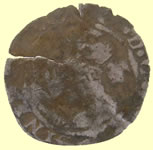 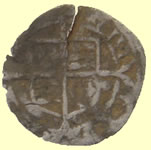 |
 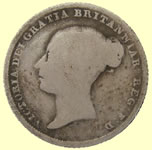 |
||
| 16th Elizabeth 1st hammered silver penny | 1839 Victorian milled silver sixpence | ||
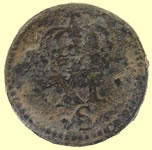 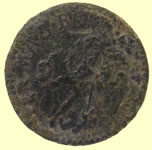 |
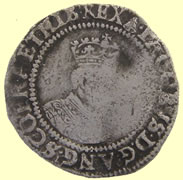 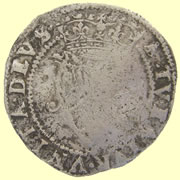 |
||
1604-19 James 1st gold Angel coin weight - 2nd coinage, revalued Obv Crown XI S Rev Angel |
1603 - 4 Irish James 1st hammered silver sixpence - Bell mint mark | ||
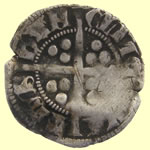 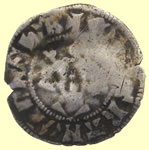 |
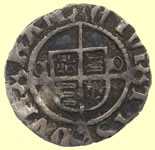 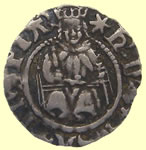 |
||
1344 Edward III hammered silver penny - Florin issue Obv EDWAR ANGLE DNS HYB Rev CIVI/TAS/DVN/OLME - Durham mint |
1526 - 1544 Henry VIII hammered silver sovereign penny - Star both sides, radiant star Obv only CD besides shield - Bishop Cuthbert Tunstall
|
||
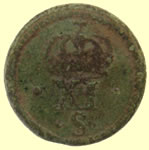 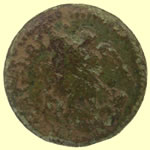 |
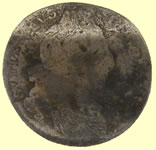 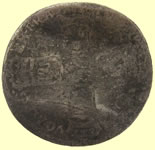 |
||
1604-19 James 1st gold Angel coin weight - 2nd coinage, revalued Obv Crown XI S Rev Angel |
1696 William III milled silver sixpence - love token | ||
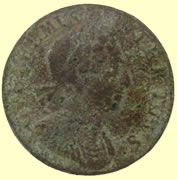 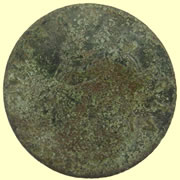 |
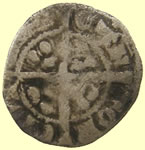 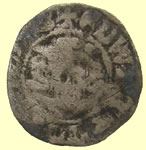 |
||
| 1694 William III copper penny | 1272 Edward hammered silver penny - Obv EDWAR ANGL DNS HYB Rev CIVI/TAS/CAN/TOR - Canterbury mint |
||
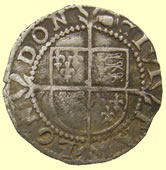 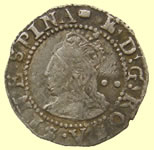 |
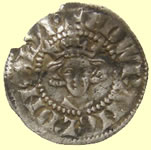 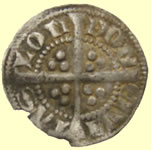 |
||
| 1592-5 Elizabeth 1st hammered silver half groat -Tun mint mark | 1344 Edward III hammered silver penny - Florin type - Cross 1 Obv EDWR ANGL DNS HYB Rev CIVI/TAS/LON/DON - London mint |
||
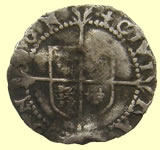 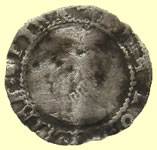 |
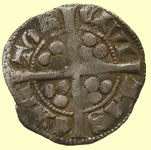 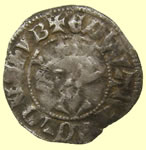 |
||
| 1578- 9 Elizabeth 1st hammered silver penny - Greek cross mint mark | 1310-14 Edward hammered silver penny - Class 11b Obv EDWAR ANGL DNS HYB Rev CIVI/TAS/CAN/TOR - Canterbury mint |
||
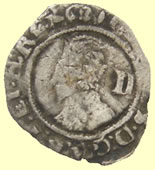 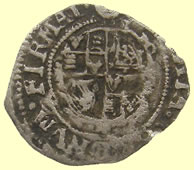 |
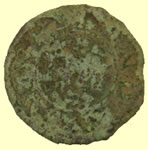 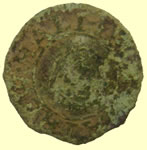 |
||
| 1644 Charles 1st hammered silver half groat - Oxford mint mark - Billet | 17thC hammered copper trade farthing | ||
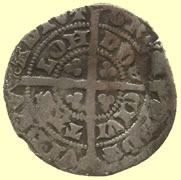 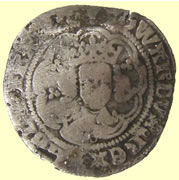 |
|||
April 1356 - June 1357 Edward III hammered silver half groat - Pre treaty series GA London Annulet below bust - Fleurs in cusps and over crown Obv EDWARDVS .REX.ANGLI FRANC Rev - +POSV/VI.DEV/.ADIVT/OREM Rev CIVI/TAS/LON/DON - London mint |
|||
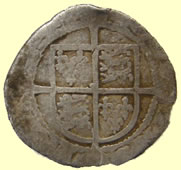 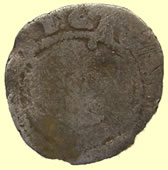 |
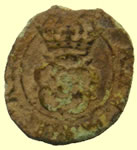 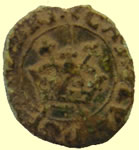 |
||
| 16thC Elizabeth 1st hammered silver half groat | 1634 Charles 1st hammered copper rose farthing | ||
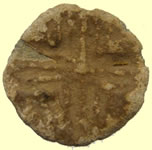 |
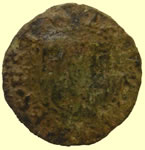 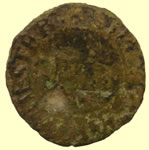 |
||
| 15thC lead token | 17thC Colchester hammered copper trade farthing | ||
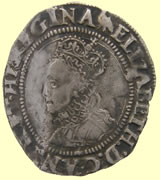 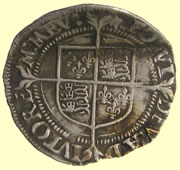 |
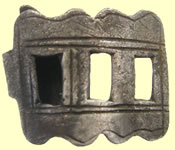 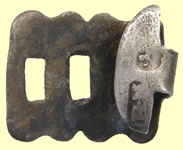 |
||
| 1560-1 Elizabeth 1st hammered silver groat - Martlett mint mark | 18thC silver clog fastener - maker probably Robert Makepeace I The Side, Newcastle Newcastle 1753 hallmark |
||
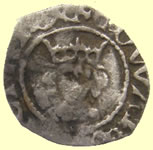 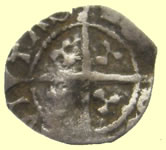 |
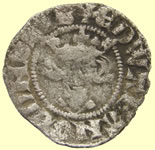 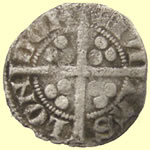 |
||
1481 -83 Edward IV hammered silver farthing Obv EDWARD DI GRA REX Rev CIVI/TAS/LON/DON - London mint |
1344 Edward III hammered silver penny - Florin type Obv EDWAR ANGL DNS HYB Rev CIVI/TAS/LON/DON - London mint |
||
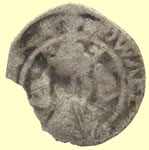 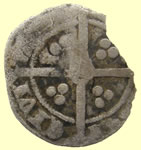 |
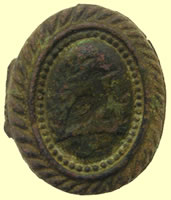 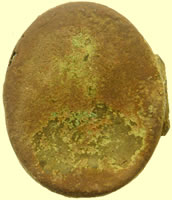 |
||
1481 - 83 Edward IV hammered silver penny - Durham mint Rose in centre of reverse cross Obv EDWAR ***** Rev CIVI/TAS/ ??? |
Georgian pill box | ||
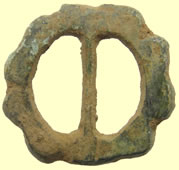 |
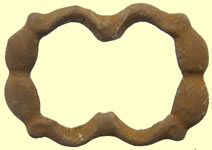 |
 |
|
Post medieval cast copper alloy buckle frame Circa AD 1600 - 1699 |
Cast copper alloy trapezoidal shoe or knee buckle with concave sides 1660-1720 |
Georgian key | |
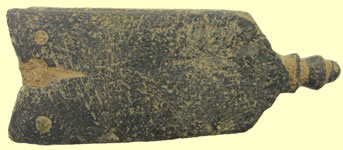  |
|||
| Medieval strap end | |||
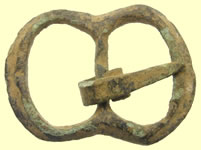 |
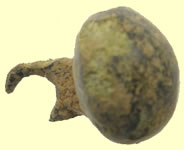 |
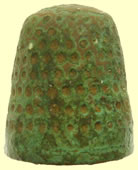 |
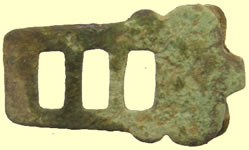 |
Post Medieval cast copper alloy single loop buckle frame. 1500-1650 AD |
16thC Tudor button | 15thC thimble | 18thC clog fastener |
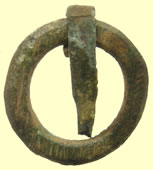 |
 |
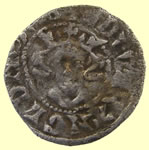 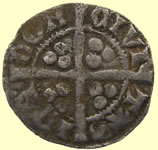 |
|
| Medieval annular buckle | Medieval harness ring | 1300 - 1310 Edward Ist hammered silver penny - Type 10 Obv EDWAR ANGL DNS HYB Rev CIVI/TAS/LON/DON - London mint |
|
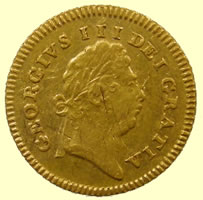 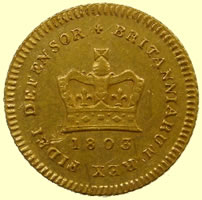 |
|||
1803 George III milled gold third guinea
2.83g, 17.27mm |
|||
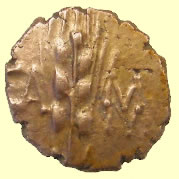 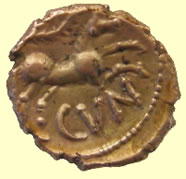 |
|||
10-40 AD Cunobelin gold qtr stater - sent to CCI for recording 1.33g, 12.82mm |
|||
  |
 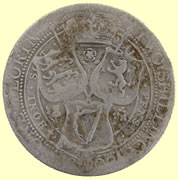 |
||
| 1247 Henry III hammered silver voided long cross half penny | 1899 Victoria milled silver Florin (24 pence) | ||
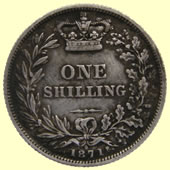 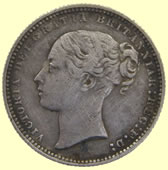 |
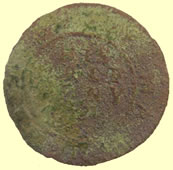 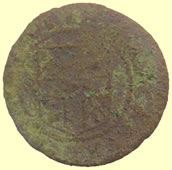 |
||
| 1871 Victoria milled silver shilling (12 pence) | 1669 Manningtree - Carter Henry, surgeon (CHYRVRGEON) 'His halfpenny' hammered copper trade token Volume II - 1319a Barber/Surgeon |
||
 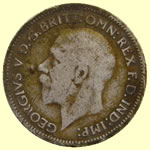 |
 |
 |
|
| 1935 George V milled silver sixpence | Early Post-Medieval (1500-1700) copper alloy belt mount in the form of an acorn, | Royal Navy Lieutenant - 1748 | |
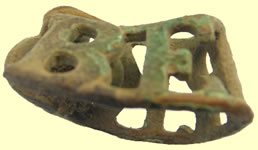 |
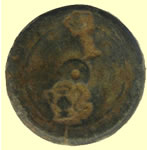 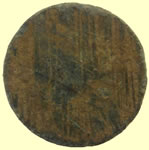 |
||
| WWI Bedfordshire regiment lapel badge | 1603 James 1st trade weight - Crown I cipher - London mint | ||
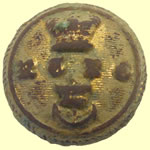 |
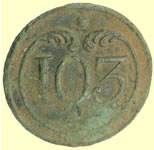 |
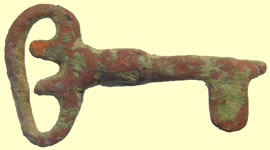 |
|
| Victorian Royal Yacht club button | French Infantry Button 103rd Line Regiment Circa 1803-1814 |
15thC casket key | |
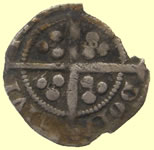 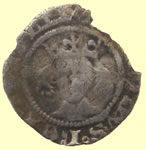 |
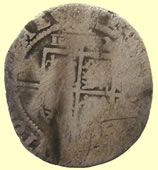 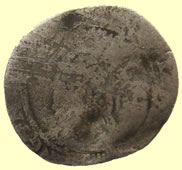 |
||
1351-61 Edward III hammered silver penny - Pre treaty period Obv EDWARDVS REX *** Rev CIVI/TAS/LON/DON - London mint 1 annulet in all 4 quadrants on rev |
1582 Elizabeth 1st hammered silver half groat | ||
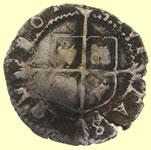 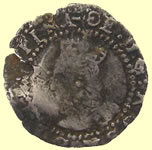 |
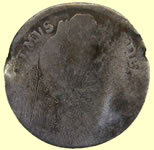 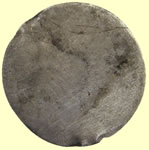 |
||
| 1595-8 Elizabeth 1st hammered silver penny - Key mintmark | 1696 William III milled silver sixpence | ||
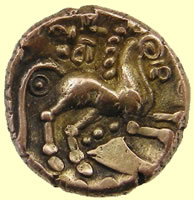 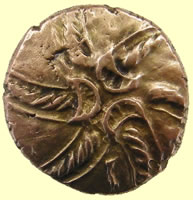 |
|||
Addedomarus 45BC Celtic gold full stater - sent to CCI for recording & reported as potential addition hoard to museum 17.98mm, 5.57g |
|||
154mm x 54mm
|
|||
| Bronze Age Axe (c.1500-1400BC) cast copper alloy primary shield pattern palstave, dating to the Acton Park Phase. | |||
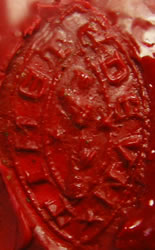 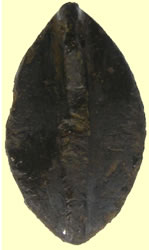 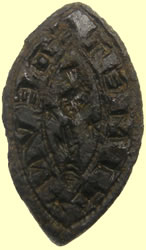 |
|||
13thC vessica seal matrix Interesting impression of an open hand with two stars above reaching for a closed fist Legend - EDEVM * TIMET |
|||
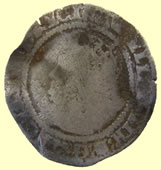 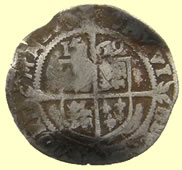 |
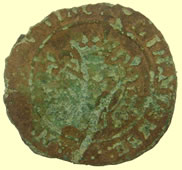 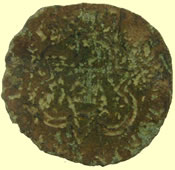 |
||
| 1569 Elizabeth 1st hammered silver 3 pence | 1586 Hans Krauwincel II Rose orb Jetton HANNS KRAVWINCKEL IN NVRENB |
||
Medieval book hinge and clasp |
|||
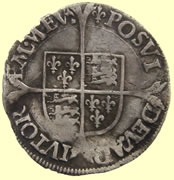 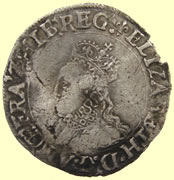 |
 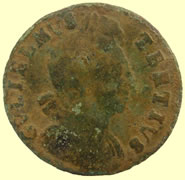 |
||
| 1558- 60 Elizabeth hammered silver groat - First Issue Lis mintmark | Great condition 1701 William III milled copper penny | ||
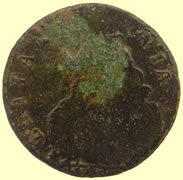 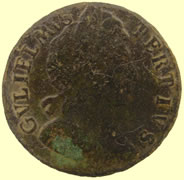 |
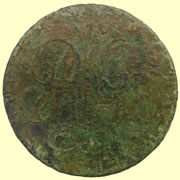 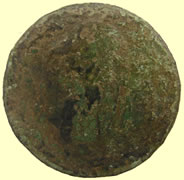 |
||
| Great condition 1694 William III milled copper penny | Druid's Head on Obverse of 1788 Anglesey Token Parys Mines Copper Tokens
|
||
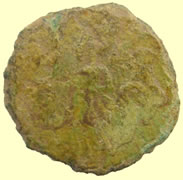 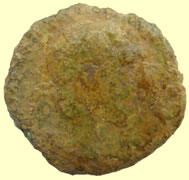 |
 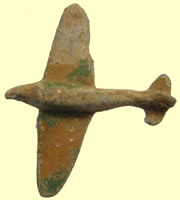 |
||
| Interesting markings on rev of this rough Roman bronze - sent for ID | WWII Hawker Hurricane lead toy aeroplane - camouflage paint still showing | ||
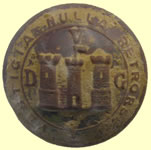 |
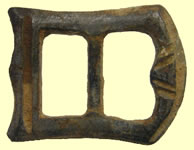 |
 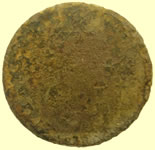 |
|
5th Dragoon guards button OR's - 1855-1922 |
A complete cast copper alloy buckle of post-medieval date. The buckle is a double loop asymmetrical shape Circa 1575- 1700 |
1675 Charles II milled copper farthing | |
 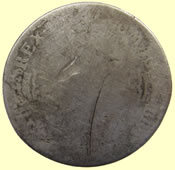 |
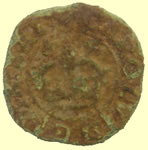 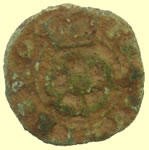 |
||
| 1696 William III milled silver shilling | 1634 Charles 1st hammered copper rose farthing | ||
 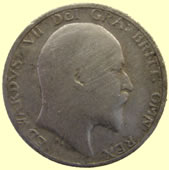 |
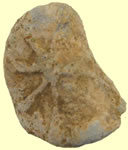 |
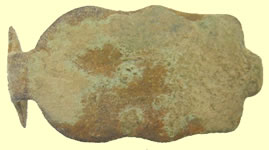 |
|
| 1910 Edward VII milled silver shilling | 15thC lead token | 18thC clog fastener | |
 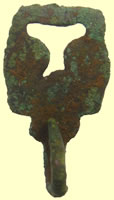 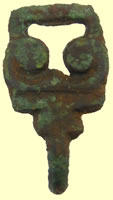 |
|||
| 16thC Tudor hooked fastener | |||
 |
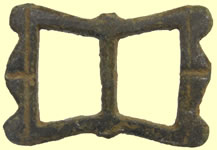 |
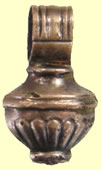 |
|
| George Rex military badge | Cast copper alloy buckle frame 1500 -1700 |
Georgian gold fob chain decoration | |
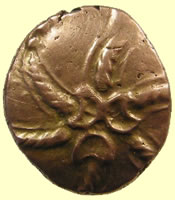 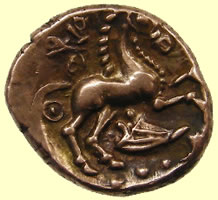 |
|||
Addedomarus 45BC Celtic gold full stater - sent to CCI for recording & reported as potential addition hoard to museum 18.68mm, 5.61g |
|||
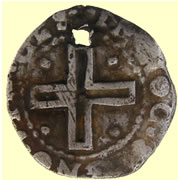 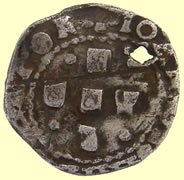 |
|||
Early hammered silver coin - possibly IOAN Polish ? researching it 2.86g, 20.72mm PORTUGAL. João IV, the Restorer, 1640-1656 AD. AR Half Tostão of 50 Reis of Lisbon, 1641. Five shields with fleurs in quadrants / Voided cross with numerals of date in quadrants |
|||
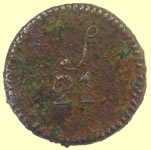 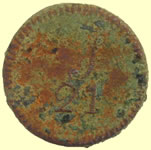 |
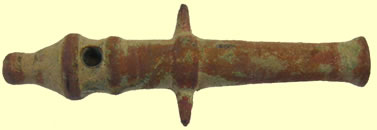 |
||
1770 21 shilling coin weight - Gold guinea Obv S 21 |
18thC toy cannon | ||
 |
 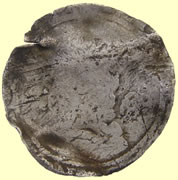 |
||
| 16thC Tudor seal spoon handle | 1580 Elizabeth 1st hammered silver sixpence | ||
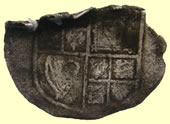 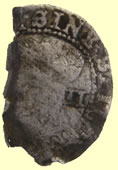 |
 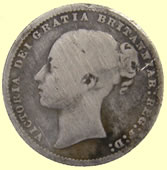 |
||
| 1603 James 1st hammered silver half groat (2 pence) | 1877 Victoria milled silver shilling (12 pence) | ||
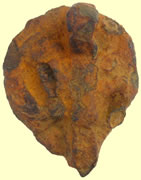  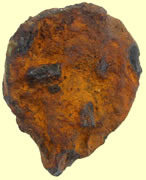 |
|||
| Medieval buckle handle mount | |||
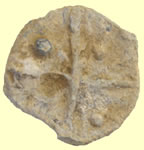 |
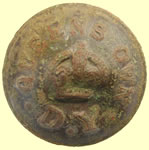 |
  |
|
| 15thC lead token - type 2 | 1855 - 1900 Queen's Own Dorset Yeomanry - founded in 1794 | 17thC decorated pewter mount | |
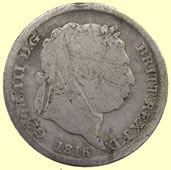 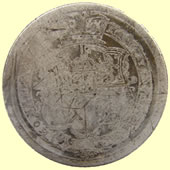 |
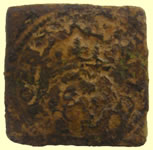 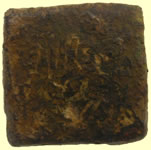 |
||
| 1816 George III milled silver shilling (12 pence) | 1526-44 Rose and Crown coin weight - Antwerp hand | ||
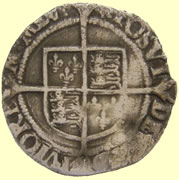 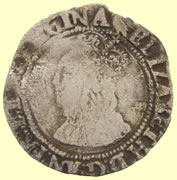 |
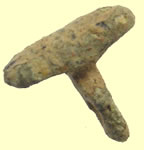 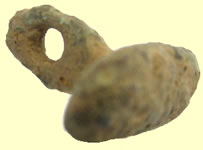 |
||
| 1560- 1 Elizabeth 1st hammered silver groat - martlett mint mark - 2nd issue | 16thC Tudor button | ||
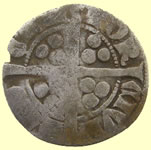 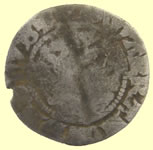 |
 |
||
1344 Edward hammered silver penny - Florin issue Obv EDWAR R ANGL DNS HYB Rev CIVI/TAS/CAN/TOR - Canterbury mint |
Large 18thC toy cannon | ||
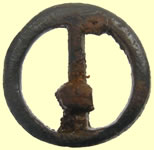 |
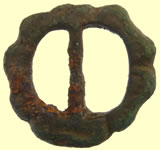 |
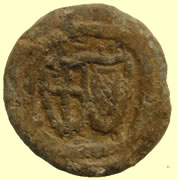 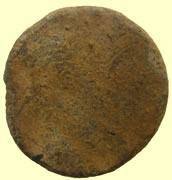 |
|
| Medieval annular buckle | Cast copper alloy double-looped sub-annular shoe or knee buckle Circa 1650-1720 |
Superb 1649 Commonwealth lead trade weight Obv Two commonwealth shields |
|
  |
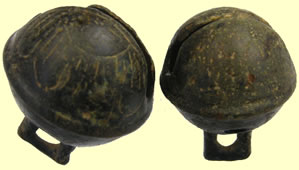 |
||
1247 Henry III hammered silver voided long cross halfpenny Rev ION/ENT - Bury St Edmunds mint - Alien moneyer |
Lot of nice early crotal bells turning up | ||
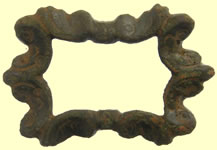 |
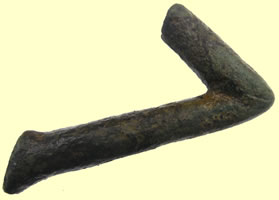 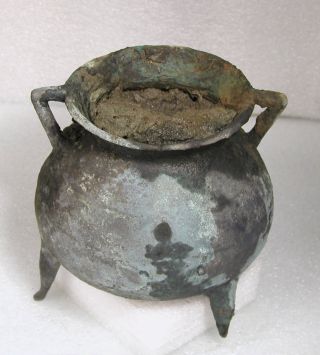 |
||
Cast copper alloy trapezoidal shoe or knee buckle with concave sides 1660-1720 |
Medieval pot handle | ||
 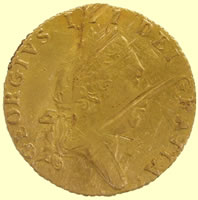 |
|||
1788 George III gold half guinea |
|||
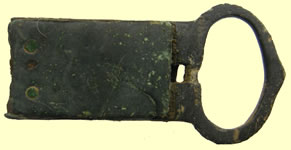 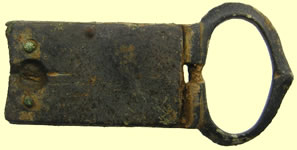 |
|||
| Medieval strap end | |||
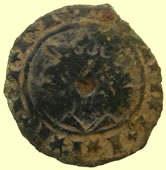 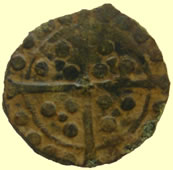 |
 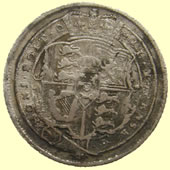 |
||
Unknown type with *I* I on Obv instead of pellets 1321 Edward II English jetton - Bust type Class XI Obv Edward bust with succession of * and I Rev Long cross with pellets Similar Ref Mitchiner 131 but with different legend
|
1818 George III milled silver shilling | ||
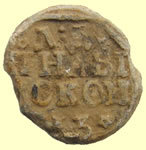 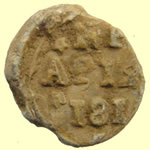 |
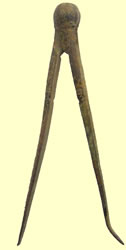 |
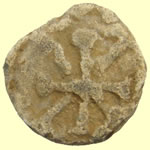 |
|
| 19thC Russian lead bale seal | Georgian dividers | 15thC lead token | |
   |
|||
| Medieval templer lead mount | |||
 |
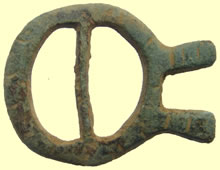 |
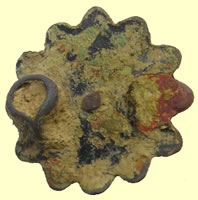 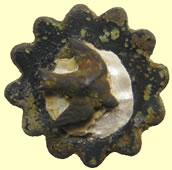 |
|
| Georgian watch winder | Annular buckle 1250 to 1650 | Edwardian enamelled brooch | |
 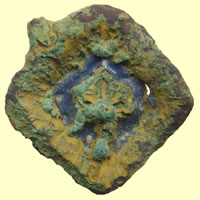 |
 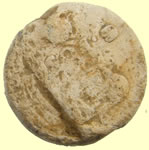 |
||
| Medieval enamelled pendant | Post medieval lead bale seal | ||
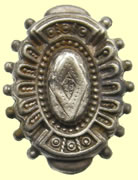 |
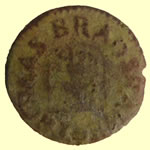 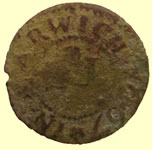 |
||
| Victorian silver locket back | 1667 Thomas Bradshaw, apothecaries of Harwich Essex hammered copper trade farthing Ref Norweb 1285 |
||
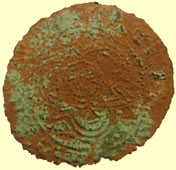 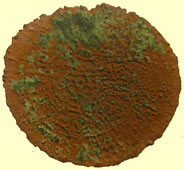 |
 |
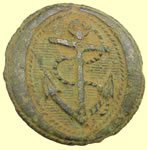 |
|
1586 Hans Krauwincel II Rose orb Jetton HANNS KRAVWINCKEL IN NVRENB |
Victorian trade weight | RN Capt / Commander - 1787 RN Lieutenant - 1787 |
|
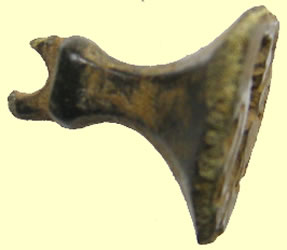 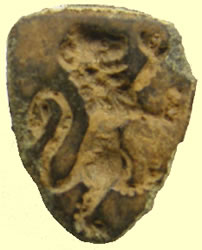 |
|||
First shield shaped 12thC seal matrix I have seen found here - got to clean it up and do a wax impression yet A copper alloy matrix with shield-shaped face and six-sided handle terminating in a rhomboid suspension loop with circular perforation. Device of a heraldic lion rampant This shield-shaped matrix bears a heraldic lion rampant; does not imply that the owner used such a lion as his arms or, indeed, that he bore arms at all; many such matrices carry heraldic creatures. Date from: AD 1200 |
|||
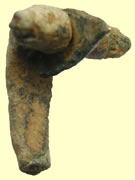 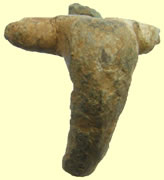 |
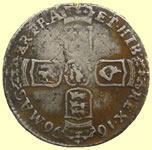 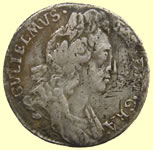 |
||
| 2ndC Roman fibular brooch | 1696 William III milled silver sixpence | ||
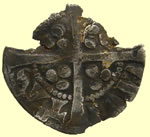 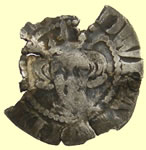 |
 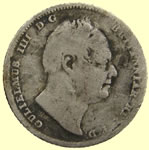 |
||
1344 Edward hammered silver penny - Florin issue Obv EDW R ANGL DNS HYB Rev CIVI/TAS/ type |
1831 William IV milled silver sixpence | ||
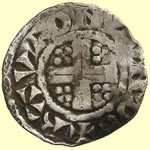 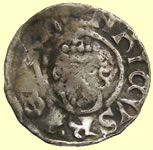 |
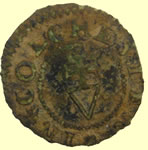 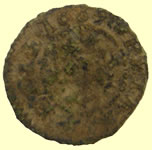 |
||
1208/9 King John hammered silver short cross penny - Class 6c Obv HENRICVS REX Rev RAVF ON LVNDE |
1669 Peter Pelle, baymaker of Colchester Essex hammered scopper trade farthing Ref Norweb 1209a |
||
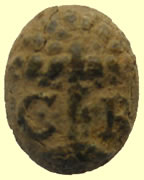 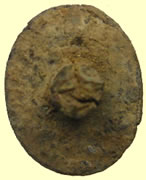 |
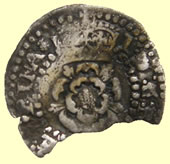 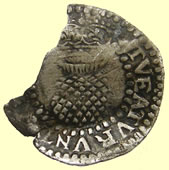 |
||
| Superb Charles Rex mount - 1625-49 Charles 1st | 1603 James 1st hammered silver half groat | ||
 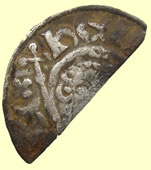 |
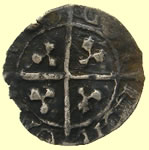 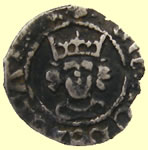 |
||
1208/9 King John hammered silver short cross half penny - Class 6 Obv HENRICVS REX Rev ABEL.ON - Abel of London mint |
1422 -61 Henry VI hammered silver half penny Obv +HENRIC REX ANGLI Rev CIVI/TAS/LON/DON - London mint |
||
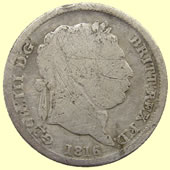 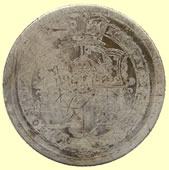 |
 |
||
| 1816 George III milled silver shilling | Royal Artillery cap badge | ||
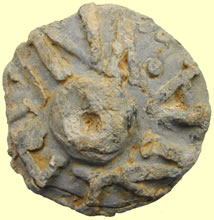 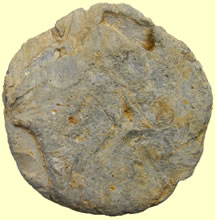 |
|||
Huge c10thC Anglo Scandinavian trade weight with runic inscription - one for the museum The inscription on the weight seems to read YN[A?}HINAA:, which does not make much sense on a first reading. You could ask Prof. Norman Biggs Dr Martin Allen |
|||
 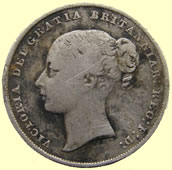 |
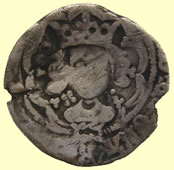 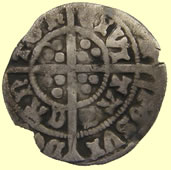 |
||
| 1844 Victoria milled silver shilling | 1464 Edward IV hammered silver half groat - Transitional Issue - quatrefoil by neck, spur under TOR on rev Obv EDWARD DI GRA REX ANGL Z FRA Rev CIVITAS/CAN/TOR - Canterbury mint (working on this coin to ID) |
||
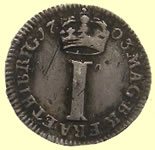 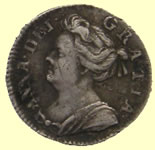  |
|||
What a great find our first ever tiny 1703 Anne milled silver penny and size comparision to half crown
|
|||
 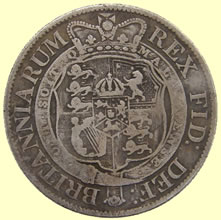 |
|||
| Monster sized 1820 George III milled silver half crown - (30 pence) | |||
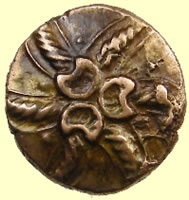 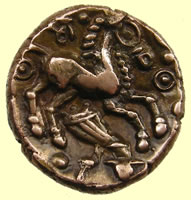 |
|||
Addedomarus 45BC Celtic gold full stater - sent to CCI for recording 17.70mm, 5.56g |
|||
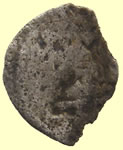 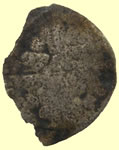 |
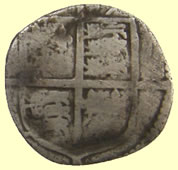 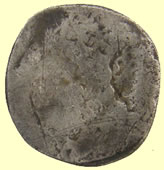 |
||
| Medieval long cross hammered silver penny | 16th Elizabeth 1st hammered silver half groat | ||
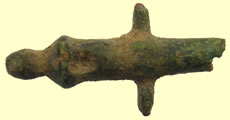 |
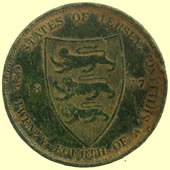 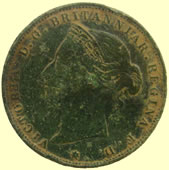 |
||
| 18thC toy cannon | 1877 Jersey Island Victoria copper penny in great shape | ||
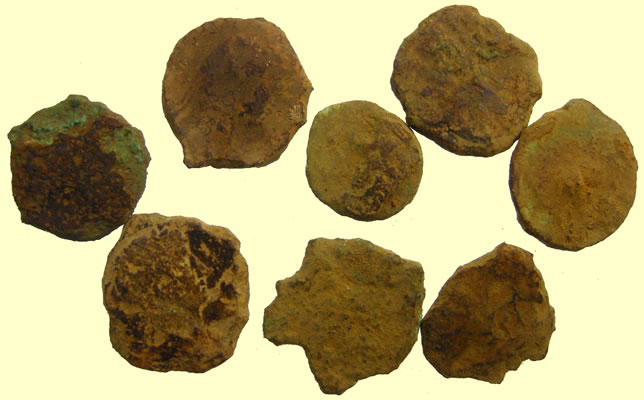 |
|||
Interesting group of rough 1stC Roman big Sestertius bronzes found in the corner of a new field by At Mike - could be a potential hoaird there ?? A couple have some detail so I will send them off to mark Lehman for an ID. What you have likely found is a "lost purse", or a very small buried hoard. Sestertii were one of the real "workhorse" denominations in circulation during the years the Romans were most active in Britain. You find a lot of denarii (relatively speaking) because that is the sort of denomination which would be likely to be squirrelled-away as savings - a "store of value" for the average man who probably never saw a piece of gold change hands in his life. It was the sestertii, dupondii & asses which really got the day-to-day work done. I'm not all that sure what exactly is in ciculation in GB these days, 1967 having been the last time I visited, but in the US, I'd compare the larger Æ coins to the $20, $10 & $5 bills - it's nearly impossible to draw comparisons between actual buying-power value, of course, since so many items in the "market basket" were vastly more or less expensive than today, but the 5, 10 & 20 make for the same levels of multiples - an as being half a dupondius and a quarter of a sestertius, and the sestertius, in turn, being a quarter of the denarius (so it doesn't quite hold up all the way through) but the denarius would be more on the order of a $100 bill - a day's pay for a soldier or tradesman. Maybe you'd take one with you if you were buying something major, but for day to day transactions, it was the large Æ's changing hands - buying a meal, modest lodging for the night, a mug of wine, etc, those sorts of things would be likely to be paid-for and priced in the Æ range. So this find of 8 sestertii together represented a little bit of wealth - a couple hundred dollars,say - but not a massive sum. The group could have been lost as a purse by a normally solvent person and would have been missed, but would not, most likely, have been a total disaster. Or perhaps a clumsy "cutpurse" might have stashed his most recent acquisition and never returned to find it, having been caught on a subsequent foray into the marketplace... We can make up scenarios for this sort of sum of money fairly easily, since it is a comprehensible sum in comprehensible units the cognate of which we probably have in our own wallets (or would have if not quite so much of our commerce were conducted with plastic). In my opinion, the 1st example looks as though it might be a youthful portrait of Commodus, son of Marcus Aurelius and his successor - While it might also be a younger portrait of Hadrian - before he cultivated his beard - the hair on your piece appears to be treated in the very curly style seen in M. Aurelius' and Commodus' portraits - see below for a Caesar-era M. Aurelius sestertius - Your 2nd piece is, well, a good bit less easy to try to match - there is a portrait there - there seems not to be any beard (which pretty much rules out Hadrian, Antoninus Pius and M. Aurelius as Augusti) the head doesn't have the "bowling-ball" aspect of Trajan's portraits. I don't think it's one of the pre-adoptives (Caligula, Claudius, Nero, Galba or Vitellius - definitely not a Flavian) So I guess we have pretty much the same pool of possibilities to draw from. A very early Hadrian or M. Aurelius - although both were almost never shown completely beardless - or a young Commodus. That's about the best I can do, given the small amount of info available - these pieces were likely minted sometime in the 2nd century. The relatively stable fiscal and political situation in the 2nd century also fits for a "working" purseful of sestertii. They circulated long enough to often be worn almost smooth in this era, meaning there was never a good reason for them to be hoarded on any widespread basis. Mark |
|||
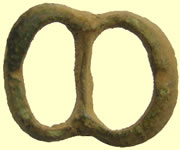 |
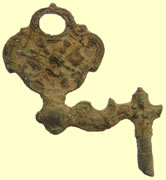 |
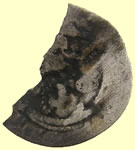 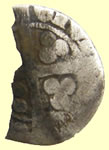 |
|
Post Medieval cast copper alloy single loop buckle frame. 1500-1650 AD |
Georgian watch winder | Medieval long cross hammered silver penny - CIVI/TAS typpe | |
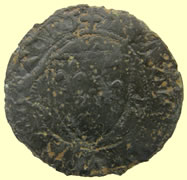 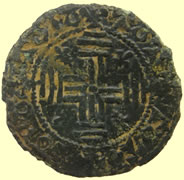 |
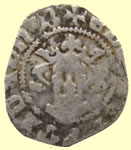 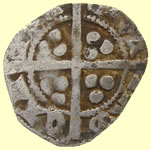 |
||
Interesting unrecorded 1422 shield of France type Jetton not in Mitchener 3 Lis in a shield with what appears to be snakes above and to sides of shield Obv + AVE MARIA + GRACIA
|
1272 Edward 1st hammered silver penny Obv EDW *** ANGL DNS HYB Rev CIVITAS/CAN/TOR - Canterbury mint |
||
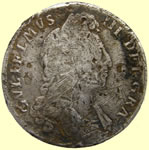 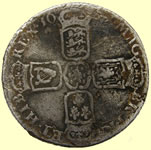 |
 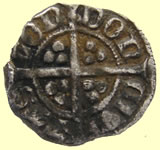 |
||
| 1696 William III milled silver sixpence | 1377-99 Richard II hammered silver half penny - Type 1b(ii) Obv RICARD'xREX'xANGL Rev CIVI/TAS/LON/DON - London mint 14.17mm, 0.52g |
||
|
|||
| 1640's English Civil War lead gun powder measure and cap | |||
 |
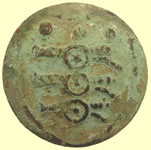 |
 |
|
| 18thC toy cannon | 1795 Royal artillery button | 1890 General servcie army button | |
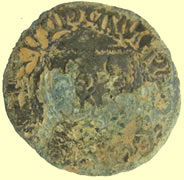 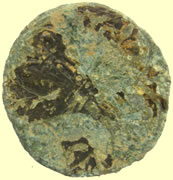 |
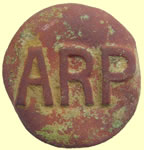 |
 |
|
1422 shield of France type Jetton 3 Lis in a shield |
|||
  |
 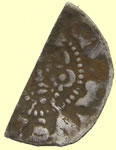 |
||
1247 Henry III hammered silver half penny- Class III Obv HENRICVS REX Rev NIC/OLE/ - Moneyer Nicole |
1247 Henry III hammered silver half penny Obv HENRICVS REX Rev DAV/ICO/ - Moneyer David of London mint |
||
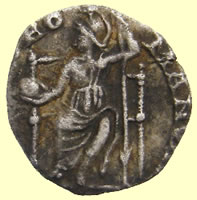 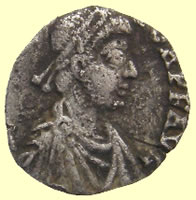 |
|||
4th/5thC Roman silver coin - sent for ID 12.52mm,0.67g |
|||
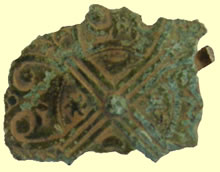 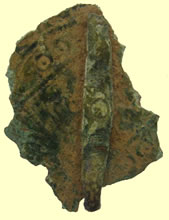 |
|||
Facinating medieval find - Looks like Jetton used as a type of mount or brooch. Researching the books |
|||
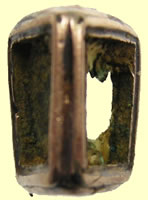 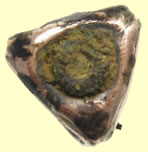 |
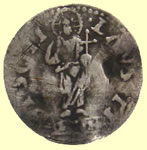 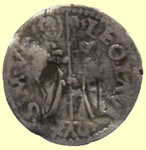 |
||
| Georgian gold triple sided fob chain hanging decoration - 3 missing stones | 1501-1521 Rev: LAVS TIBI SOLI (Thee Alone be Praised). Haloed figure of Christ holding a cross. Obv: LE LAV DVX S M V (Leonardo Lauredan, Doge. St Mark of Venice.) Doge kneeling before Saint Mark. |
||
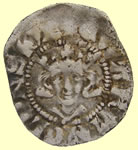 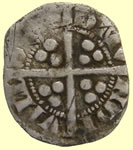 |
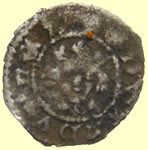 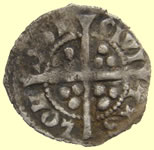 |
||
1300-10 Edward 1st hammered silver penny - Class 10 Obv + EDWAR ANGLE DNS HYB Rev VILL/SCIE/DMV/NDI- Bury St Edmunds mint |
1300-10 Edward 1st hammered silver farthing - New issue with inner circles both sides - Closed C Type 28 Obv +EDWARDVS REX Rev CIVI/TAS/LON/DON |
||
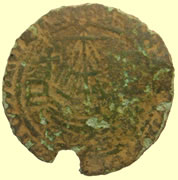 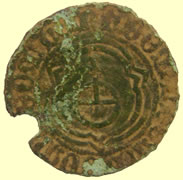 |
 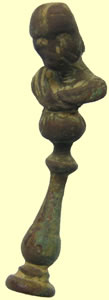 |
||
| 1525 'Ship -orb' Jetton - fictitious inscription | Beauty Georgian pipe tamper | ||
Started new page |
|||
 |
|||

